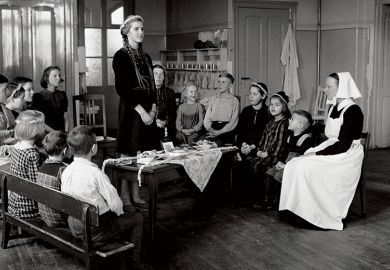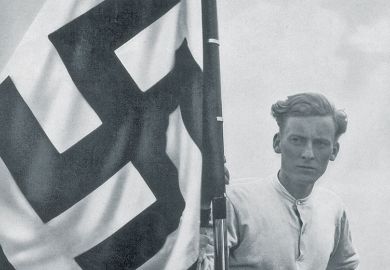Back in 2015, a reader of Konrad Jarausch’s book Out of the Ashes: A New History of Europe in the Twentieth Century left a comment on Amazon asking the professor of European civilisation to write about how life was experienced on the streets of Germany. The fruit of this request is Broken Lives. And what a rich topic this is! So much happened during this time: defeat in two world wars, a Holocaust, two different types of dictatorship, a wall dividing Germany into two countries and then reunification, leading to an East German chancellor elected in a country that is the strongest economic power in Europe.
Modern Germany has a pretty amazing story. In fact, it has a multitude of fascinating stories belonging to the people who were there and lived through the upheavals. A master of his craft, Jarausch taps into these stories to build a detailed picture of life on the ground (what the Germans call “Alltagsgeschichte”, or everyday history) and, in so doing, evokes many different atmospheres and reactions to events.
With Hitler rising to prominence in the early 1930s, Germans of all backgrounds had to decide how to react. When a woman called Mrs Baucke found the antisemitic journal Der Stürmer in the family’s coffee shop, she stormed into the study, thumped the paper on the desk and hissed “Hugo, I won’t have this trash in my house”, reminding her husband of how many of their loyal customers were Jewish. Some Germans were too young to be interested in politics, of course, as one memoirist wrote: “In 1932, I was only in my tenth year and knew about politics almost as much as a fish about flying.” But equally, a young Jewish boy named Frank Eyck did not have the luxury of ignorance and recalled instinctively feeling that, from the day Hitler seized power, “my parents could no longer protect me. The carefree atmosphere of childhood had gone. Nothing could be taken for granted anymore.” In spite of the differences in their responses, all three of these individuals were present at and had their lives punctuated to some degree by this seminal moment in Germany’s history.
How different people experience war, and how it shapes their lives, is influenced to a great extent by their age, and the stage of life they have reached, when conflict begins. Since Mark Roseman’s pioneering collection of essays Generations in Conflict: Youth Revolt and Generation Formation in Germany (1995), social historians have begun to identify striking patterns. Mary Fulbrook’s Dissonant Lives: Generations and Violence through the German Dictatorships (2011), for example, dealt with how Germans of different eras lived through the 20th century. Jarausch, by contrast, homes in on the perspective of those who were born in the 1920s, the children of the Weimar era. Growing up, the “Brexit” conversation of the day was about who would restore Germany to greatness after defeat in war and economic turmoil in its aftermath. As children, this group witnessed Hitler’s seizure of power on 30 January 1933, and they experienced the Second World War as young adults. By the time they reached retirement age, East and West Germany were reuniting and a whole new chapter in German history was starting.
There was, of course, huge variation in how the events of the 20th century made themselves felt in the lives of this group, but what makes the Weimar cohort so fascinating is that “they all shared the disruption of their own life courses by historic forces outside of their control”. As Jarausch puts it: “Their existence was not the expected progression from happy childhood via turbulent adolescence to mature adulthood with professional success and loving family, but rather a constant struggle against the surprising challenges of depression, dictatorship, war and privation.”
Crucially, the suffering they experienced as a result of dictatorship and war, he argues, led most of them to embrace human rights, pacifism, social solidarity and ecology, shaping the Germany that we recognise today.
The book uses memoirs written by “Weimar children” to build up a more general picture of the time they lived through. “Retirement retrospectives” are notoriously problematic for historians because of the time that will have passed between the events lived and the period when they are recalled and recorded. They are all but inevitably shaped by hindsight, by the knowledge of what happened next. Jarausch is mindful of this, however, acknowledging that ego narratives are both promising and problematic. Although they may have pitfalls for telling us what actually happened in the past, he explains, they have strengths in that they record “how one has become who one is”, and they capture stories that would otherwise be lost with the death of their authors.
This particular cohort often had to confront the mismatch between their fond recollections of life in the 1930s, including their enthusiastic participation in the Hitler Youth, and their subsequent knowledge of the scale of Nazi atrocities, and their memoirs showcase the processing of this tension.
Unlike many histories based on memoirs, Broken Lives is not just a patchwork stitching together of thematised quotations. As a social history of a cohort, it is exemplary: while Jarausch is careful not to overclaim what his source material shows, he nonetheless uses the testimony effectively, as building blocks for a full and vivid general depiction of each era, encompassing and explaining variations based on class, race, gender and geographical region. We see this when Jarausch evocatively introduces the contrasting but typical childhood worlds experienced in the Weimar era: “Most Weimar children were born at home. Birth was considered a natural act rather than a medical problem…The formative environment was the family home, whose size and location depended on the father’s earning power.”
Broken Lives is strongest when discussing the particularity of the cohort’s experiences, since much of the book covers familiar ground for those who know the period well. Overall, Jarausch is a class act as a researcher. Every pronouncement is carefully weighed and underpinned with evidence. His thorough, considered approach epitomises social history at its very best.
Through the medium of memoirs, Broken Lives offers an explanation for Germany’s dramatic reversal of fortunes from catastrophe to civility. The exceptionally negative history that Germans have to refer to accounts for the fact that, in spite of the country’s contemporary position as a strong, influential pillar of European democracy, Germans consistently rank at the bottom of the scale in international comparisons of “national pride”. Jarausch suggests that Germans who lived through this time reflected on them and then determined that dictatorship, war and the Holocaust should never happen again. “Heeding the lessons of experience and memory”, Jarausch believes, “has transformed many Germans into sincere democrats and pacifists who want to prevent a recurrence of earlier horrors.”
Hester Vaizey is the author of Born in the GDR: Living in the Shadow of the Wall (2014).
Broken Lives: How Ordinary Germans Experienced the 20th Century
By Konrad H. Jarausch
Princeton University Press
464pp, £27.00
ISBN 9780691174587
Published 27 June 2018
The author
Konrad Jarausch, Lurcy professor of European civilisation at the University of North Carolina at Chapel Hill, was born in Magdeburg, Germany on 14 August 1941 – the very day when Churchill and Roosevelt issued their Atlantic Charter setting out the Allied vision for the post-war world. He spent his childhood in different parts of Bavaria, which means, he says, that he “lack[s] the attachment to a mythical Heimat and live[s] now during the summer in Berlin”.
Jarausch went to the US to work in 1960, but stayed to do American studies at the University of Wyoming in Laramie. “As a result, I added an Americanised early adulthood to my classical training in Germany, giving me an inside/outside perspective on German affairs. I have become a transatlantic hybrid, appreciating the strengths and deploring the weaknesses of both sides.”
The difficulties of producing the “history from below” found in Broken Lives are more than matched by its rewards: “The key challenge is to give ordinary people a voice without either romanticising or patronising them. The travails of the 20th century have created astounding life-histories, full of ruptures and reinventions that allowed people to survive wars and dictatorships. Confronting their complicity and their subsequent suffering provides insights into the complexity of the human condition.”
At a time when many countries are grappling with illiberal forces, Jarausch sees both a warning and more positive lessons from German history.
“How could a cultured people engage in world wars and the Holocaust?” he asks. “And how did a country overcome the stain of its complicity and become a stable democracy? While answers to the former question provide a chilling cautionary tale of vulnerability to evil, responses to the latter offer a more hopeful story of partial redemption through self-critical learning.”
Matthew Reisz
POSTSCRIPT:
Print headline: How civility grew from catastrophe
Register to continue
Why register?
- Registration is free and only takes a moment
- Once registered, you can read 3 articles a month
- Sign up for our newsletter
Subscribe
Or subscribe for unlimited access to:
- Unlimited access to news, views, insights & reviews
- Digital editions
- Digital access to THE’s university and college rankings analysis
Already registered or a current subscriber?








